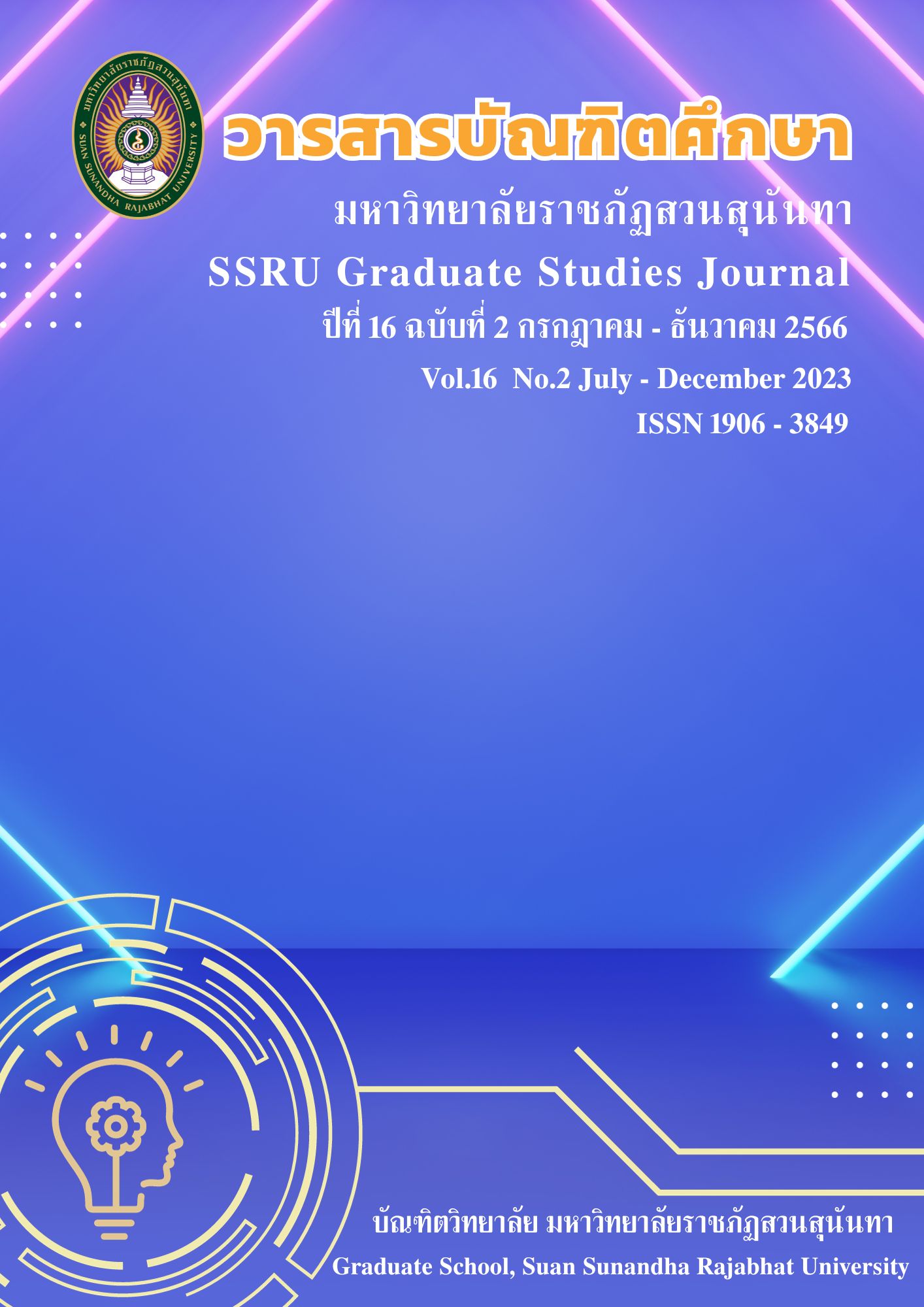Qualifications of Desirable Accountant of Enterprises in the Digital Era
Main Article Content
Abstract
The objectives of this research were: 1) to study the qualifications of desirable accountants in enterprises in the digital era; and 2) to conduct a comparative analysis of desirable accountant attributes, categorized by business model, registered capital, and experience in establishing businesses in the special economic zone of Mueang Nakhon Phanom District. The sample size was determined to be 268 participants using the Taro Yamane formula. The research employed a combination of a questionnaire and a focus group discussion guide. Data analysis approaches involved descriptive statistics, comprising percentages, averages, and standard deviations. Inferential statistics encompassed independent sample t-tests, One-Way ANOVA, and the Scheffe double test, all at a statistical significance level of 0.05. The research findings revealed that the level of agreement among establishments regarding the characteristics of desirable accountants in the digital era was very high. When considering each aspect, it was found that the most crucial qualifications establishments seek in accountants are skills and individual characteristics, particularly caution and suspicion as a practitioner. The hypothesis test results showed that establishments with different levels of business experience had varying requirements for the qualifications of desirable accountants, particularly in terms of interaction skills and communication, with a statistical significance of 0.05.
Article Details

This work is licensed under a Creative Commons Attribution-NonCommercial-NoDerivatives 4.0 International License.
References
กรมพัฒนาธุรกิจการค้าจังหวัดนครพนม. (2565). ข้อมูลธุรกิจเขตพัฒนาเศรษฐกิจพิเศษ นครพนม. สืบค้นจาก https://www.dbd.go.th/data-storage/attachment/b7f78d014465e1aa095d5393.pdf
กาญจนา มงคลนิพัทธ์ และนิตยา มณีนาค. (2559). คุณสมบัติของนักบัญชีที่พึงประสงค์สำหรับอุตสาหกรรมชิ้นส่วนยานยนต์ในประเทศไทย. (รายงานการวิจัยประจำปี 2559). นครปฐม: มหาวิทยาลัยเทคโนโลยีราชมงคลรัตนโกสินทร์.
กัญฐณา ดิษฐ์แก้ว, ยุพรัตน์ จันทร์แก้ว, นิภาพร นุ่มนวล และเชิดพงษ์ ขาประดิษฐ์. (2559). คุณสมบัติของนักบัญชีที่พึงประสงค์สำหรับวิสาหกิจขนาดกลางและขนาดย่อม (SMEs) ในเขตอำเภอเมือง จังหวัดตาก. (รายงานการวิจัย). คณะบริหารธุรกิจและศิลปศาสตร์: มหาวิทยาลัยเทคโนโลยีราชมงคลล้านนา ตาก.
ชลิดา ลิ้นจี่, กนกมณี หอมแก้ว และสุภาพร บุญเอี่ยม. (2563). ความรู้และทักษะวิชาชีพของนักบัญชีสำนักงานบัญชีคุณภาพในประเทศไทย. วารสารศิลปการจัดการ, 4(1), 34-45.
ธานินทร์ ศิลป์จารุ. (2563). การวิจัยและวิเคราะห์ข้อมูลทางสถิติด้วย SPSS และ AMOS. กรุงเทพฯ: บิสซิเนสอาร์แอนด์ดี.
ประนอม ตังปรีชาพาณิชย์. (2555). คุณลักษณะและคุณสมบัติของพนักงานบัญชีที่พึงประสงค์ตามทัศนะของสถานประกอบการ ศึกษากรณีสถานประกอบการในนิคมอุตสาหกรรมจังหวัดสมุทรสาคร. วารสารวิชาการคณะบริหารธุรกิจ มหาวิทยาลัยเทคโนโลยีราชมงคลธัญบุรี, 7(2), 158-173.
พรสิริ สุขผ่อง และนัยนา แคล้วเครือ. (2565). สมรรถนะนักบัญชีที่พึงประสงค์ของสถานประกอบการในยุคดิจิทัล. วารสารมหาวิทยาลัยราชภัฏลำปาง, 11(1), 146-156.
มาลิณี สายก้อน และไพฑูรย์ อินต๊ะขัน. (2555). คุณลักษณะของบัณฑิตสาขาวิชาการบัญชีที่พึงประสงค์. วารสารมหาวิทยาลัยราชภัฏลำปาง, 1(1), 77-86.
วรพรรณ รัตนทรงธรรม, วริศรา ดวงตาน้อย, สุพรรษา จิตต์มั่น และตุลาพร จันทร์กวี. (2564). คุณลักษณะของนักบัญชีที่พึงประสงค์สำหรับสถานประกอบการในจังหวัดอุตรดิตถ์. วารสารบริหารธุรกิจอุตสาหกรรม, 3(2), 5-20.
วันวิสา กลิ่นหอม และพรเทพ รัตนตรัยภพ. (2561). คุณลักษณะของนักบัญชีที่ผู้ประกอบการในนิคมอุตสาหกรรมจังหวัดพระนครศรีอยุธยาพึงพอใจ. ใน การประชุมวิชาการและนำเสนอผลงานระดับชาติ UTCC Academic Day ครั้งที่ 2 (631-645). กรุงเทพฯ: มหาวิทยาลัยหอการค้าไทย.
สภาวิชาชีพบัญชีในพระบรมราชูปถัมภ์. (2563). มาตรฐานการศึกษาระหว่างประเทศสำหรับผู้ประกอบวิชาชีพบัญชี ฉบับที่ 3 เรื่องทักษะวิชาชีพ. สืบค้นจาก www.tfac.or.th/upload/9414/1s721TNQoM.pdf
สภาวิชาชีพบัญชีในพระบรมราชูปถัมภ์. (2563). พระราชบัญญัติวิชาชีพบัญชี พ.ศ. 2547. สืบค้นจาก https://www.tfac.or.th/Article/Detail/66888
สำนักงานบัญชีร่วมแรงและแบ่งปัน. (2564). คุณสมบัติของนักบัญชีมืออาชีพตามข้อกำหนดของ IES. สืบค้นจาก http://tac.prosmes.com/Article/Detail/21682/
สุดธิดา การด. (2562). คุณลักษณะอันพึงประสงค์ของนักวิชาชีพบัญชีในยุคดิจิทัลของสถานประกอบการในจังหวัดเลย. สารนิพนธ์หลักสูตรบัญชีมหาบัณฑิต. กรุงเทพมหานคร: มหาวิทยาลัยธุรกิจบัณฑิตย์.
Ala-Heikkilä, V , & Järvenpää, M (2003) Management accountants’ image, role and identity: employer branding and identity conflict. Qualitative Research in Accounting & Management, 20(3), 337-371.
Alamäki, A., & Korpela, P. (2021). Digital transformation and value-based selling activities: seller and buyer perspectives. Baltic Journal of Management, 16(2), 298-317.
Chen, J., Liu, L., & Wang, Y. (2021). Business model innovation and growth of manufacturing SMEs: a social exchange perspective. Journal of Manufacturing Technology Management, 32(2), 290-312.
Franke, F., & Hiebl, M.R.W. (2023). Big data and decision quality: the role of management accountants’ data analytics skills. International Journal of Accounting & Information Management, 31(1), 93-127.
Peter, M.K., Kraft, C., & Lindeque, J. (2020). Strategic action fields of digital transformation: An exploration of the strategic action fields of Swiss SMEs and large enterprises. Journal of Strategy and Management, 13(1), 160-180.
Palumbo, R. (2023). Involved at work and disinvolved out of work: unraveling the implications of involvement on accountants’ work–life balance. Management Decision, 61(13), 26-53.


